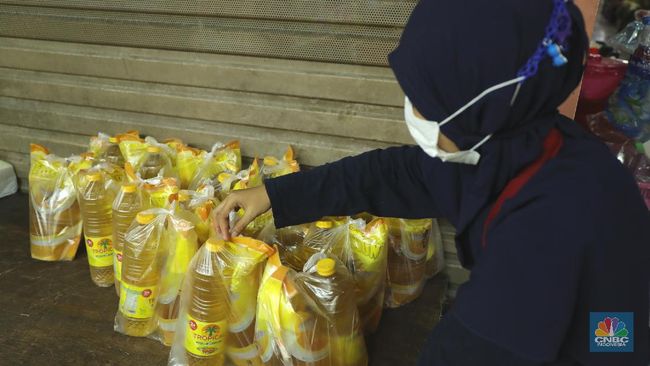Jakarta, CNBC Indonesia – The palm oil crisis has taken its toll. This was stated by the Executive Director of the Indonesian Vegetable Oil Industry Association (GIMNI) Sahat Sinaga to CNBC Indonesia, some time ago.
According to him, six cooking oil producers (migor) have stopped producing. This is the result of not getting a supply of CPO.
“The policy of meeting domestic needs (domestic market obligation/ DMO) can only be implemented by integrated companies. Namely, producers who export and supply to the domestic market, aka integrated companies,” he explained.
“GIMNI members have 34 cooking oil producers, only 16 are integrated. The rest are producers whose market is only domestic. Then, there are companies outside of GIMNI, which are only exporters of cooking oil.”
He explained that exporters would find it difficult to market CPO domestically without a business connection. Meanwhile, local migrant producers find it difficult to buy from exporters. Sahat also said that this problem should be helped by the government. This allows both parties to work together.
Meanwhile, India has also reportedly asked Indonesia to increase the supply of palm oil to the country. The request was due to the vacancy of sunflower oil related to the crisis in Ukraine.
For information, so far oil is supplied from the Black Sea region. Russia and Ukraine, which are currently at war, will supply 13% or 1.6 million tonnes of oil for India’s food needs by 2021.
Meanwhile, more than half of India’s needs come from Indonesia. Report Reuters Earlier this month, officials from the two countries met virtually to discuss India’s needs.
“India is also said to have asked Indonesia to temporarily reduce biodiesel blending, which currently requires B30. “In the meantime, Indonesia can prioritize food over fuel,” said a source.
The price of crude palm oil (CPO) itself also continues to increase in price. In trading last Thursday (3/3/2022), the contact price reached a new record of 7,108 Malaysian ringgir per tonne, the website reported. tradingeconomics.com.
India’s CIF price for delivery in March 2022 is US$1,925 per tonne of CPO. Soybean oil is US$1,865 per tonne and rapeseed oil is US$1,900 per tonne.
“Asian and European refineries have increased their palm oil purchases for almost a month to replace sunflower oil. This buying action has pushed palm oil prices to irrational levels,” Reuters citing sources.
B30 Should I Stop For A Moment?
To CNBC Indonesia, Director of the Center of Economic and Law Studies Bhima Yudhistira said the government should immediately reduce the consumption of CPO for B30 and focus on food needs. That way the supply of CPO for migrants can be guaranteed and the price will not fluctuate again.
“B30 has to give in for a while. That way, CPO for biodiesel has gone from 43% to below 30%. This can be done, no regulations are violated. It’s just a communication problem from the government. The government can temporarily stop the B30 subsidy from BPDPKS,” he explained.
In 2020, he explained that BPDPKS would disburse Rp 28 trillion in funds and become Rp 51.86 trillion in 2021 for intensive B30. This must be done because it is a priority for food.
“It must be done because it is a priority for food. Biodiesle producers are given an understanding because this is a national situation. From 2015 to 2021, the total volume of BBN (biofuel) type of biodiesel paid for is 29.14 million kiloliters with a fund of Rp110 trillion. While the total volume distribution reached 33.07 million kiloliters. This means that so far the government has also assisted biodiesel players,” said Bhima.
According to him, the temporary cessation of subsidies to reduce consumption of CPO B30 does not close the domestic biodiesel industry.
“It will continue to operate. But if the subsidy is temporarily stopped, it will create a disincentive for biodiesel players. Eventually the volume will decrease. It’s not that biodiesel is prohibited but subsidies are stopped. The point is that there must be a priority,” said Bhima.
In 2021, GAPKI data reports 18.42 million toll roads of CPO and CPKO production out of a total of 51.3 million tons consumed locally. Namely 8.95 million tons of food, 2.12 million tons of oleochemicals, and 7.34 million tons of biodiesel.
While the rest are exports, with a total of 2.73 million in the form of CPO. The remainder is processed including lauric, biodiesel and oleochemicals.
(npb/npb)
–


